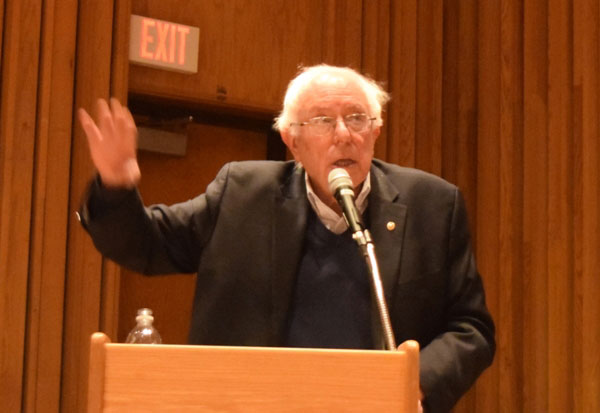Sanders: We’re moving backward

Bernie Sanders
Senator Bernie Sanders accompanied a student panel at Johnson State College on Feb. 17, 2015 to participate in a town hall style meeting focused around affordable higher education, climate change, money in politics, and issues surrounding women. These subjects were represented by panelists Sammie Gorton, Robert Beauregard, John Dabrowski and Danielle Paladino, respectively.
Dabrowski began the meeting, following an introduction by Student Government Association President Benjamin Simone, by presenting his stance on big money in politics and how the supreme court recently ruled to eliminate remaining restrictions on campaign contributions. He said that this means corporations and the very wealthy are allowed to donate any sum of money to a political cause or candidate at will.
“This redefines what the supreme court views as free speech,” Dabrowski said. “They sort of view money as a form of free speech. The problem I see with that is some people have more money than others, so in a way, some people have more free speech than others.”
Sanders saw this as a problem in allowing democracy to work the way that it is supposed to and include those who are not able to speak with money. “At the end of the day, there is nothing more important than to see democracy flourish and grow so that in every sense of the word, ordinary Americans can make the decisions which guide our local government, state government and federal government,” said Sanders.
To begin her address, Paladino presented a series of positive facts on issues regarding women. This included that Vermont currently has the third lowest rate of teen pregnancy and the lowest wage gap out of all the states. However, there are a lot of problems that should not be ignored, she said, including the significant number women whose mental health is being neglected and issues regarding finances. She also indicated that despite Vermont’s low violent crime rates, women still face alarming amounts of domestic and sexual violence.
“We are in an age with a need for rapid change, and progression cannot be overlooked,” said Paladino. “We can no longer settle for the treatment of any human being or living organism, for that matter, to be less than another.”
The treatment of Earth is also not to be ignored, as Beauregard covered the state of the global climate, and how the Republican Party is actively opposing the facts regarding its change, problems with rising temperatures and sources of renewable energy. Sanders’ position on this matter was made explicit when he gave an overview on the four topics after the panelists were finished.
“It is not simply a disagreement,” said Sanders. “It really is an embarrassment that we have the dominant party— Republicans now control the house and the senate— who are rejecting basic science. The debate over climate change is long over.”
Lastly, problems regarding the price of education were acknowledged as being a significant issue, especially for the state of Vt. This was described by Gorton through her own personal story and later reinforced by Sanders.
“How are we moving backwards?” Sanders said, explaining that all over America, tuition used to be free or close to free 40 to 50 years ago. “If we want to have decent paying jobs in America it goes without saying, we need the best educated workforce in the world.”
Sanders hopes to see improvements in how the budget committee decides to spend money regarding investments such as higher education and infrastructure, and emphasized that he is now the ranking member of the committee.
While Sanders does what he can with the budget while working with opposing politicians, he offered an alternative for those who want to see immediate change. “I will tell you without the slightest hesitation,” he said, “if you want to lower the cost of college, if you want radical change in dealing with high interest loans, you can do it in five minutes. One million college students march on Washington and tell the United States Congress enough is enough, we want to make college and student debt affordable, you’ll bring that about.”
In keeping with the town meeting style, Sanders opened the floor to students and community members who wanted to voice their opinions or ask questions.
These questions included concern over military budgeting, to which Sanders believes can be cut judiciously; militarizing police forces, which he opposes, saying that the police force should be better integrated in the community to avoid viewing them as an opposition; degree inflation, to which he did not have a response; GMO labelling, saying that people have the right to know what they are eating; gerrymandering, which he says will not be changed without the elimination of voter suppression and making it easier for everyone to vote; ways to cut fuel usage; the competency of college students in the present day to organize and become activists—which Sanders says he hopes students understand that they do have the power to make change happen; among others.
Regarding the speculation of Sanders’ future plans to run for president, he says: “If I do it, it has to be done well… I think there is a real hunger in this country now for candidates, not just myself, to be speaking for the needs of working families and showing an indication to be prepared to take on these very powerful people.”
Marilyn joined the Basement Medicine staff in Spring 2015 as a staff writer and managing editor.
Jeffrey joined the Basement Medicine staff in the Spring 2015 semester serving as staff writer and photo editor.





